Reflective Essay on Experience & Learning in PSKC Module at LSST
VerifiedAdded on 2023/06/17
|9
|1257
|263
Essay
AI Summary
This essay presents a reflective analysis of learning experiences within the PSKC (Preparing for Success Knowledge & Creativity) module at LSST (London School of Science & Technology). It begins by defining reflection and introduces prominent theories by Schon and Kolb, before focusing on Driscoll’s model (What? So what? Now what?) to structure the reflection. The essay explores the student's individual performance, behavior, and experiences, analyzing strengths and weaknesses. It discusses how the student has developed as an effective learner, using specific examples from the PSKC module, and outlines future plans for meeting the challenges and expectations of university coursework. The conclusion emphasizes the importance of reflective learning for skill and knowledge development, highlighting its impact on both personal and professional growth. Desklib provides access to similar essays and learning resources for students.
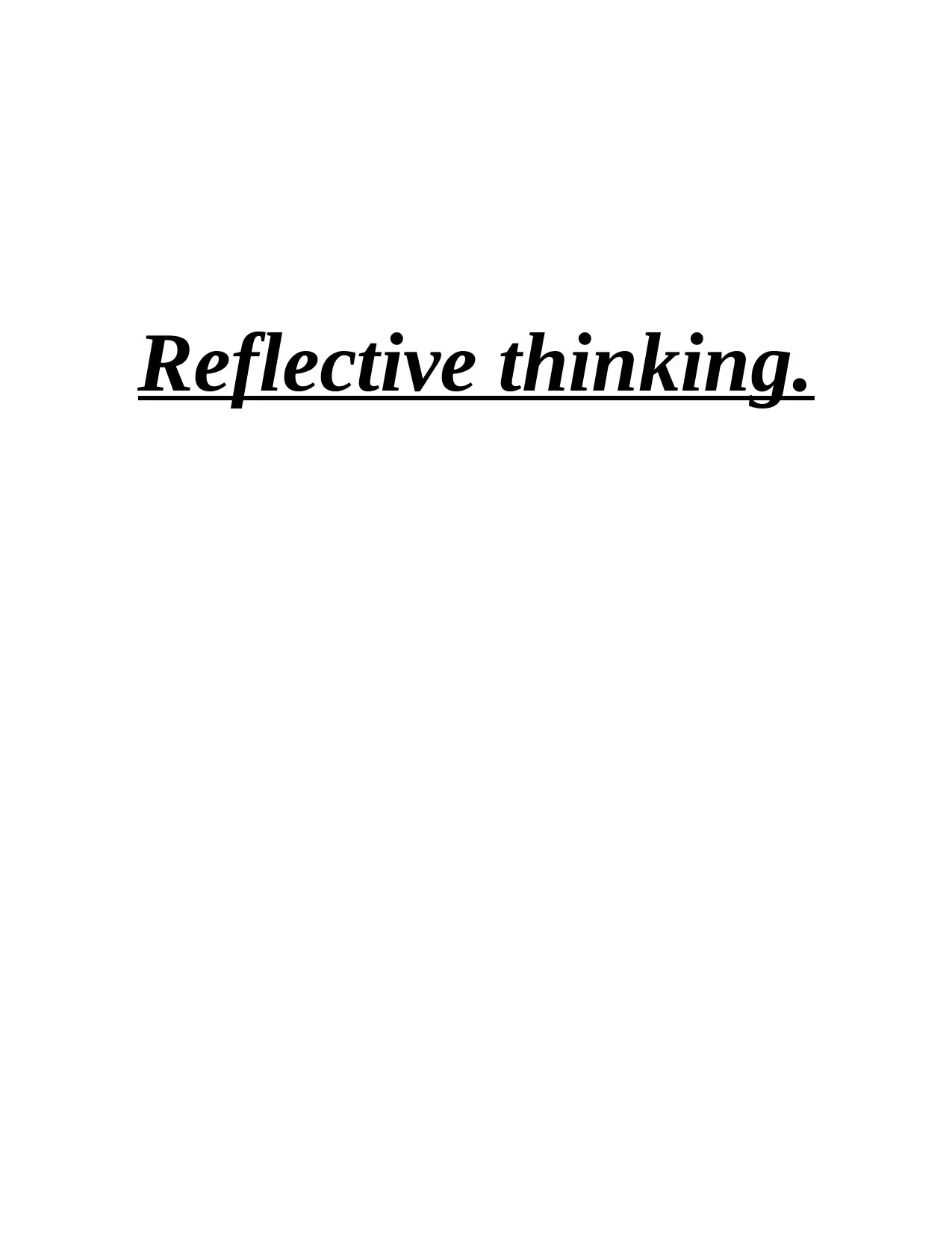
Reflective thinking.
Paraphrase This Document
Need a fresh take? Get an instant paraphrase of this document with our AI Paraphraser

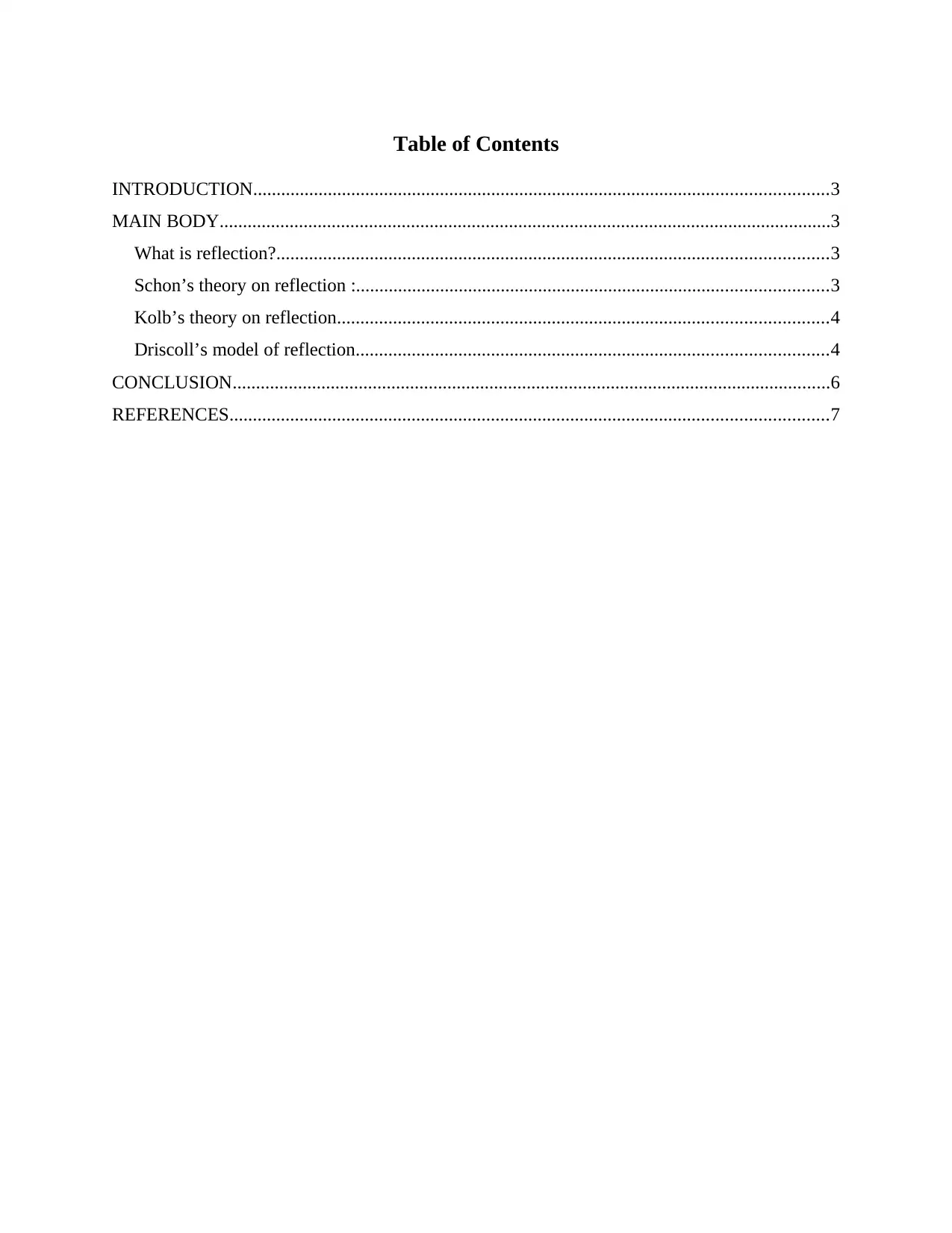
Table of Contents
INTRODUCTION...........................................................................................................................3
MAIN BODY...................................................................................................................................3
What is reflection?......................................................................................................................3
Schon’s theory on reflection :.....................................................................................................3
Kolb’s theory on reflection.........................................................................................................4
Driscoll’s model of reflection.....................................................................................................4
CONCLUSION................................................................................................................................6
REFERENCES................................................................................................................................7
INTRODUCTION...........................................................................................................................3
MAIN BODY...................................................................................................................................3
What is reflection?......................................................................................................................3
Schon’s theory on reflection :.....................................................................................................3
Kolb’s theory on reflection.........................................................................................................4
Driscoll’s model of reflection.....................................................................................................4
CONCLUSION................................................................................................................................6
REFERENCES................................................................................................................................7
⊘ This is a preview!⊘
Do you want full access?
Subscribe today to unlock all pages.

Trusted by 1+ million students worldwide
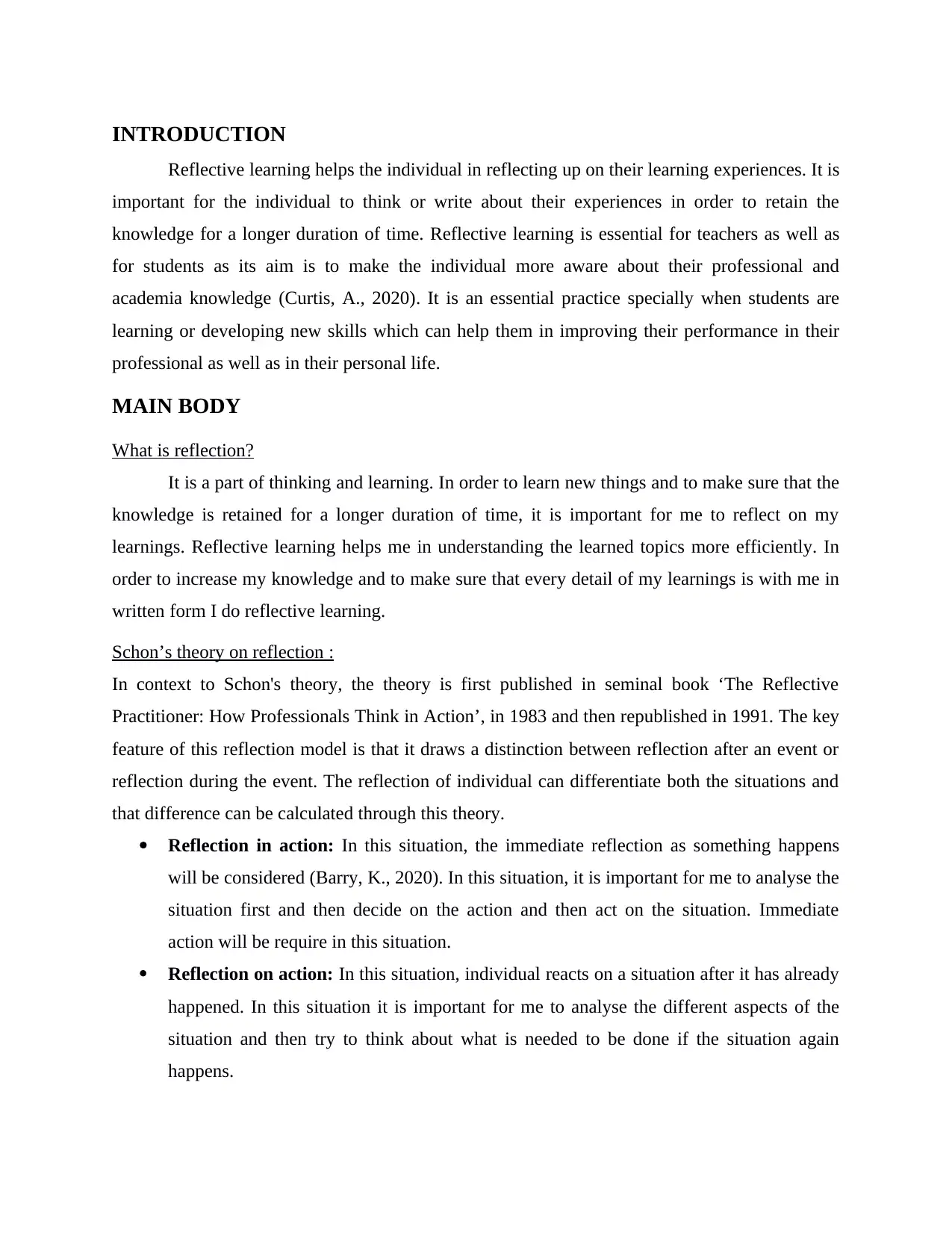
INTRODUCTION
Reflective learning helps the individual in reflecting up on their learning experiences. It is
important for the individual to think or write about their experiences in order to retain the
knowledge for a longer duration of time. Reflective learning is essential for teachers as well as
for students as its aim is to make the individual more aware about their professional and
academia knowledge (Curtis, A., 2020). It is an essential practice specially when students are
learning or developing new skills which can help them in improving their performance in their
professional as well as in their personal life.
MAIN BODY
What is reflection?
It is a part of thinking and learning. In order to learn new things and to make sure that the
knowledge is retained for a longer duration of time, it is important for me to reflect on my
learnings. Reflective learning helps me in understanding the learned topics more efficiently. In
order to increase my knowledge and to make sure that every detail of my learnings is with me in
written form I do reflective learning.
Schon’s theory on reflection :
In context to Schon's theory, the theory is first published in seminal book ‘The Reflective
Practitioner: How Professionals Think in Action’, in 1983 and then republished in 1991. The key
feature of this reflection model is that it draws a distinction between reflection after an event or
reflection during the event. The reflection of individual can differentiate both the situations and
that difference can be calculated through this theory.
Reflection in action: In this situation, the immediate reflection as something happens
will be considered (Barry, K., 2020). In this situation, it is important for me to analyse the
situation first and then decide on the action and then act on the situation. Immediate
action will be require in this situation.
Reflection on action: In this situation, individual reacts on a situation after it has already
happened. In this situation it is important for me to analyse the different aspects of the
situation and then try to think about what is needed to be done if the situation again
happens.
Reflective learning helps the individual in reflecting up on their learning experiences. It is
important for the individual to think or write about their experiences in order to retain the
knowledge for a longer duration of time. Reflective learning is essential for teachers as well as
for students as its aim is to make the individual more aware about their professional and
academia knowledge (Curtis, A., 2020). It is an essential practice specially when students are
learning or developing new skills which can help them in improving their performance in their
professional as well as in their personal life.
MAIN BODY
What is reflection?
It is a part of thinking and learning. In order to learn new things and to make sure that the
knowledge is retained for a longer duration of time, it is important for me to reflect on my
learnings. Reflective learning helps me in understanding the learned topics more efficiently. In
order to increase my knowledge and to make sure that every detail of my learnings is with me in
written form I do reflective learning.
Schon’s theory on reflection :
In context to Schon's theory, the theory is first published in seminal book ‘The Reflective
Practitioner: How Professionals Think in Action’, in 1983 and then republished in 1991. The key
feature of this reflection model is that it draws a distinction between reflection after an event or
reflection during the event. The reflection of individual can differentiate both the situations and
that difference can be calculated through this theory.
Reflection in action: In this situation, the immediate reflection as something happens
will be considered (Barry, K., 2020). In this situation, it is important for me to analyse the
situation first and then decide on the action and then act on the situation. Immediate
action will be require in this situation.
Reflection on action: In this situation, individual reacts on a situation after it has already
happened. In this situation it is important for me to analyse the different aspects of the
situation and then try to think about what is needed to be done if the situation again
happens.
Paraphrase This Document
Need a fresh take? Get an instant paraphrase of this document with our AI Paraphraser
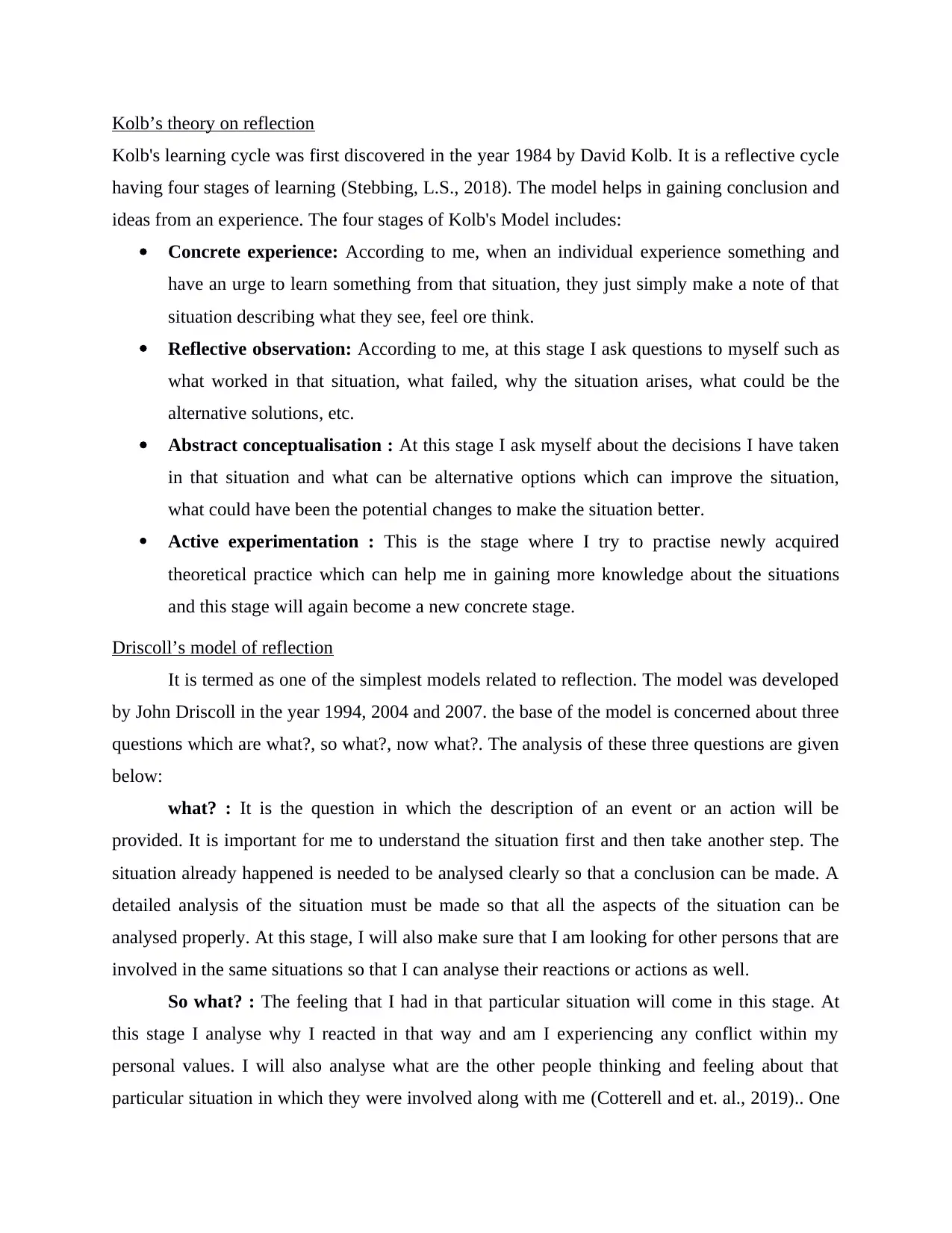
Kolb’s theory on reflection
Kolb's learning cycle was first discovered in the year 1984 by David Kolb. It is a reflective cycle
having four stages of learning (Stebbing, L.S., 2018). The model helps in gaining conclusion and
ideas from an experience. The four stages of Kolb's Model includes:
Concrete experience: According to me, when an individual experience something and
have an urge to learn something from that situation, they just simply make a note of that
situation describing what they see, feel ore think.
Reflective observation: According to me, at this stage I ask questions to myself such as
what worked in that situation, what failed, why the situation arises, what could be the
alternative solutions, etc.
Abstract conceptualisation : At this stage I ask myself about the decisions I have taken
in that situation and what can be alternative options which can improve the situation,
what could have been the potential changes to make the situation better.
Active experimentation : This is the stage where I try to practise newly acquired
theoretical practice which can help me in gaining more knowledge about the situations
and this stage will again become a new concrete stage.
Driscoll’s model of reflection
It is termed as one of the simplest models related to reflection. The model was developed
by John Driscoll in the year 1994, 2004 and 2007. the base of the model is concerned about three
questions which are what?, so what?, now what?. The analysis of these three questions are given
below:
what? : It is the question in which the description of an event or an action will be
provided. It is important for me to understand the situation first and then take another step. The
situation already happened is needed to be analysed clearly so that a conclusion can be made. A
detailed analysis of the situation must be made so that all the aspects of the situation can be
analysed properly. At this stage, I will also make sure that I am looking for other persons that are
involved in the same situations so that I can analyse their reactions or actions as well.
So what? : The feeling that I had in that particular situation will come in this stage. At
this stage I analyse why I reacted in that way and am I experiencing any conflict within my
personal values. I will also analyse what are the other people thinking and feeling about that
particular situation in which they were involved along with me (Cotterell and et. al., 2019).. One
Kolb's learning cycle was first discovered in the year 1984 by David Kolb. It is a reflective cycle
having four stages of learning (Stebbing, L.S., 2018). The model helps in gaining conclusion and
ideas from an experience. The four stages of Kolb's Model includes:
Concrete experience: According to me, when an individual experience something and
have an urge to learn something from that situation, they just simply make a note of that
situation describing what they see, feel ore think.
Reflective observation: According to me, at this stage I ask questions to myself such as
what worked in that situation, what failed, why the situation arises, what could be the
alternative solutions, etc.
Abstract conceptualisation : At this stage I ask myself about the decisions I have taken
in that situation and what can be alternative options which can improve the situation,
what could have been the potential changes to make the situation better.
Active experimentation : This is the stage where I try to practise newly acquired
theoretical practice which can help me in gaining more knowledge about the situations
and this stage will again become a new concrete stage.
Driscoll’s model of reflection
It is termed as one of the simplest models related to reflection. The model was developed
by John Driscoll in the year 1994, 2004 and 2007. the base of the model is concerned about three
questions which are what?, so what?, now what?. The analysis of these three questions are given
below:
what? : It is the question in which the description of an event or an action will be
provided. It is important for me to understand the situation first and then take another step. The
situation already happened is needed to be analysed clearly so that a conclusion can be made. A
detailed analysis of the situation must be made so that all the aspects of the situation can be
analysed properly. At this stage, I will also make sure that I am looking for other persons that are
involved in the same situations so that I can analyse their reactions or actions as well.
So what? : The feeling that I had in that particular situation will come in this stage. At
this stage I analyse why I reacted in that way and am I experiencing any conflict within my
personal values. I will also analyse what are the other people thinking and feeling about that
particular situation in which they were involved along with me (Cotterell and et. al., 2019).. One
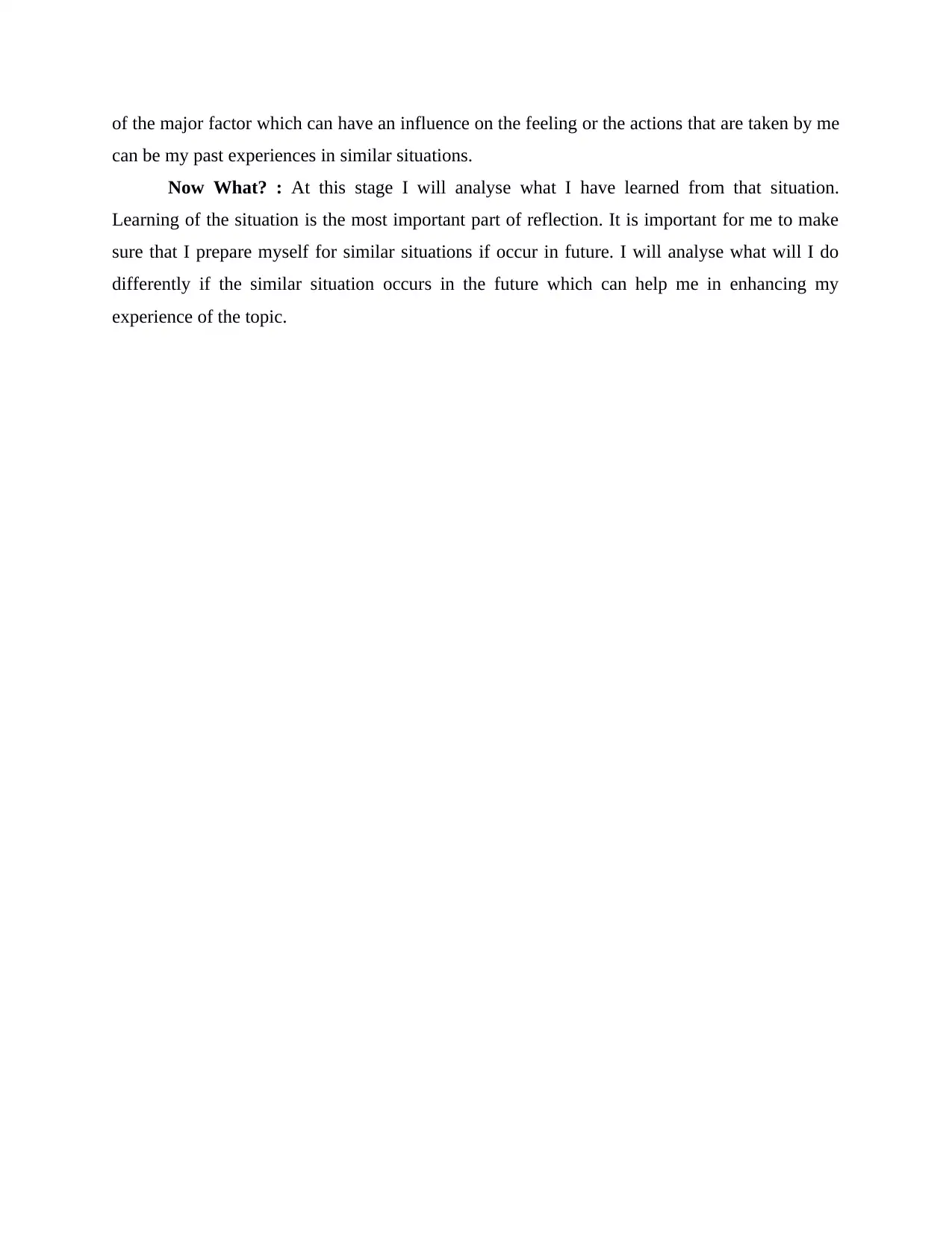
of the major factor which can have an influence on the feeling or the actions that are taken by me
can be my past experiences in similar situations.
Now What? : At this stage I will analyse what I have learned from that situation.
Learning of the situation is the most important part of reflection. It is important for me to make
sure that I prepare myself for similar situations if occur in future. I will analyse what will I do
differently if the similar situation occurs in the future which can help me in enhancing my
experience of the topic.
can be my past experiences in similar situations.
Now What? : At this stage I will analyse what I have learned from that situation.
Learning of the situation is the most important part of reflection. It is important for me to make
sure that I prepare myself for similar situations if occur in future. I will analyse what will I do
differently if the similar situation occurs in the future which can help me in enhancing my
experience of the topic.
⊘ This is a preview!⊘
Do you want full access?
Subscribe today to unlock all pages.

Trusted by 1+ million students worldwide
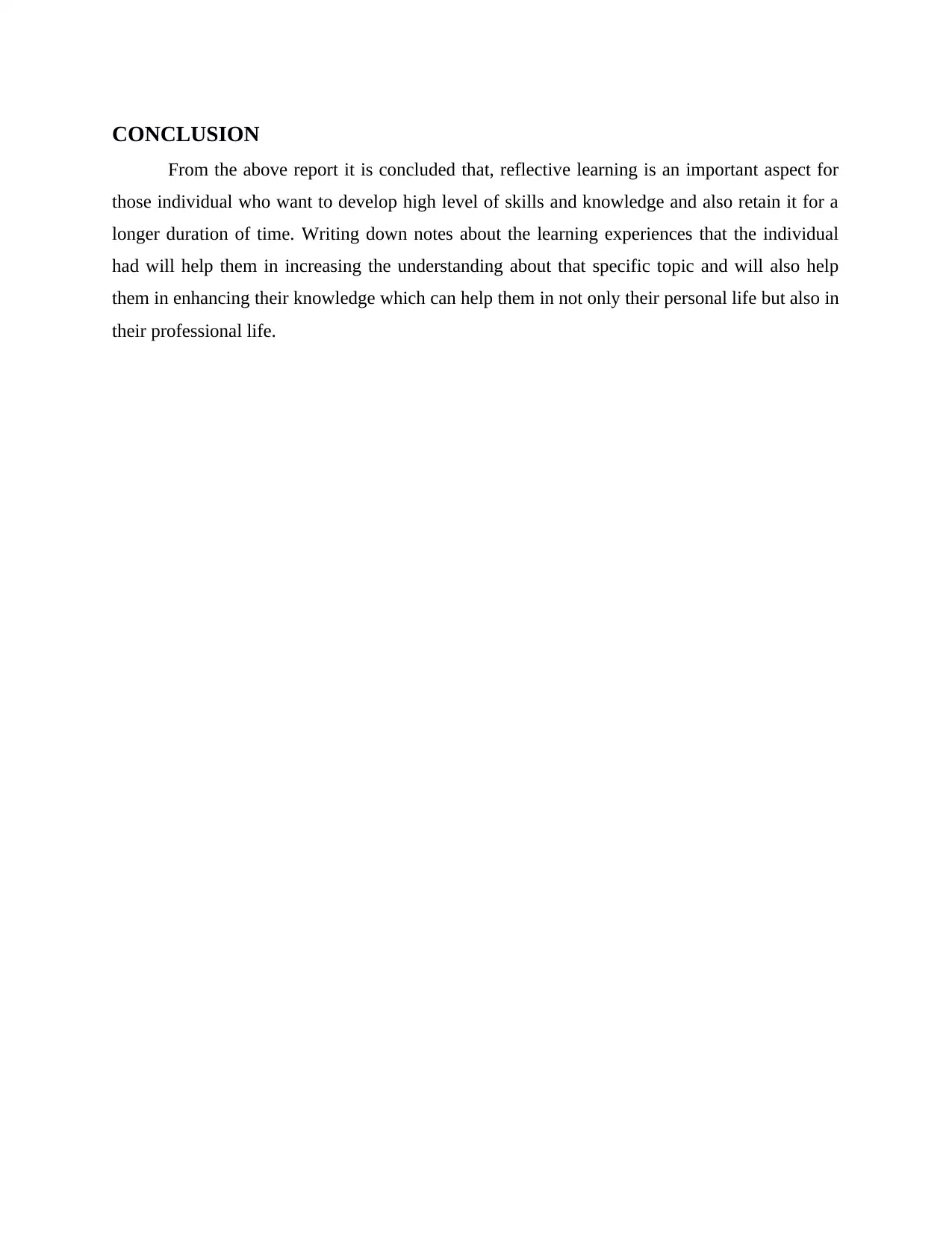
CONCLUSION
From the above report it is concluded that, reflective learning is an important aspect for
those individual who want to develop high level of skills and knowledge and also retain it for a
longer duration of time. Writing down notes about the learning experiences that the individual
had will help them in increasing the understanding about that specific topic and will also help
them in enhancing their knowledge which can help them in not only their personal life but also in
their professional life.
From the above report it is concluded that, reflective learning is an important aspect for
those individual who want to develop high level of skills and knowledge and also retain it for a
longer duration of time. Writing down notes about the learning experiences that the individual
had will help them in increasing the understanding about that specific topic and will also help
them in enhancing their knowledge which can help them in not only their personal life but also in
their professional life.
Paraphrase This Document
Need a fresh take? Get an instant paraphrase of this document with our AI Paraphraser
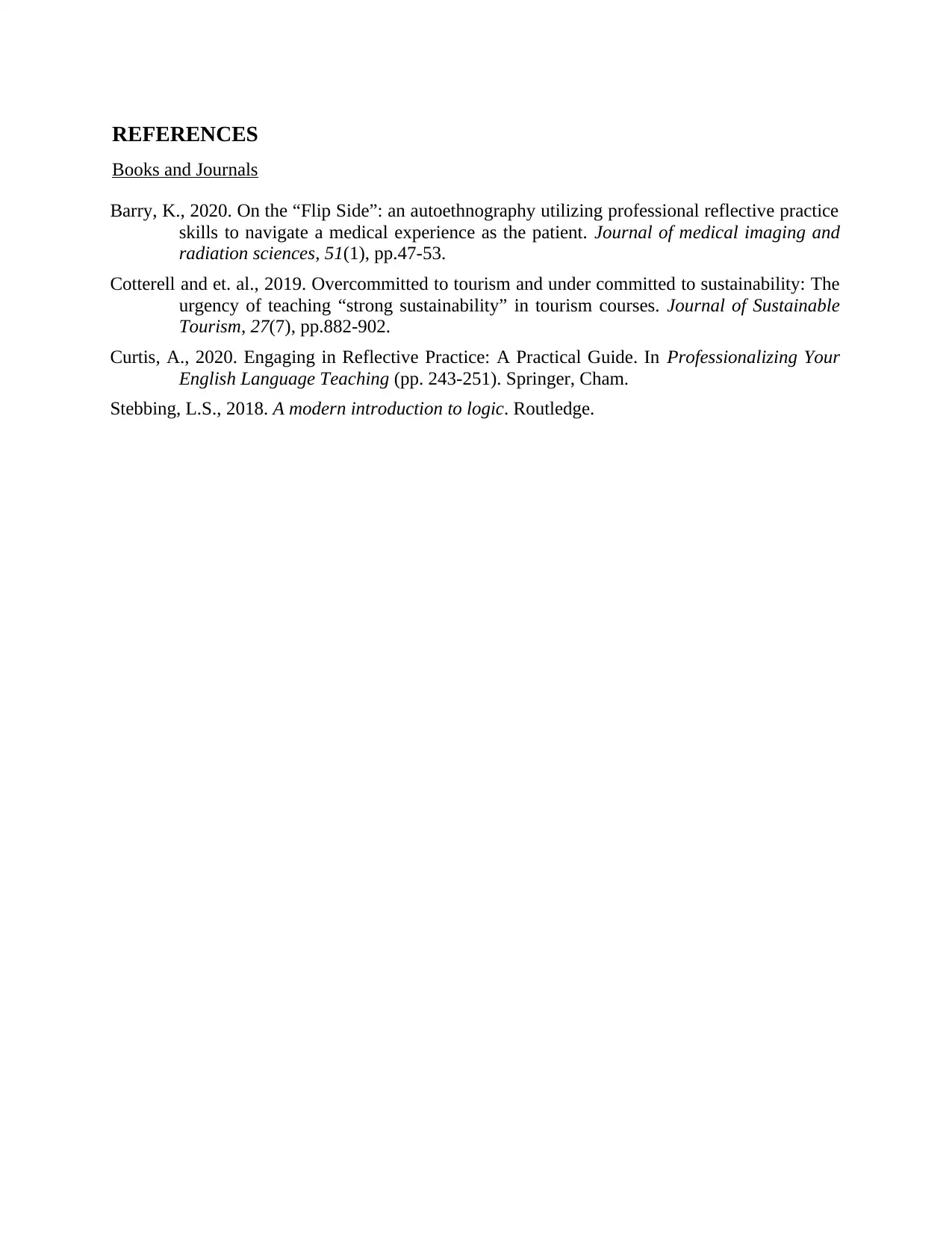
REFERENCES
Books and Journals
Barry, K., 2020. On the “Flip Side”: an autoethnography utilizing professional reflective practice
skills to navigate a medical experience as the patient. Journal of medical imaging and
radiation sciences, 51(1), pp.47-53.
Cotterell and et. al., 2019. Overcommitted to tourism and under committed to sustainability: The
urgency of teaching “strong sustainability” in tourism courses. Journal of Sustainable
Tourism, 27(7), pp.882-902.
Curtis, A., 2020. Engaging in Reflective Practice: A Practical Guide. In Professionalizing Your
English Language Teaching (pp. 243-251). Springer, Cham.
Stebbing, L.S., 2018. A modern introduction to logic. Routledge.
Books and Journals
Barry, K., 2020. On the “Flip Side”: an autoethnography utilizing professional reflective practice
skills to navigate a medical experience as the patient. Journal of medical imaging and
radiation sciences, 51(1), pp.47-53.
Cotterell and et. al., 2019. Overcommitted to tourism and under committed to sustainability: The
urgency of teaching “strong sustainability” in tourism courses. Journal of Sustainable
Tourism, 27(7), pp.882-902.
Curtis, A., 2020. Engaging in Reflective Practice: A Practical Guide. In Professionalizing Your
English Language Teaching (pp. 243-251). Springer, Cham.
Stebbing, L.S., 2018. A modern introduction to logic. Routledge.

9
⊘ This is a preview!⊘
Do you want full access?
Subscribe today to unlock all pages.

Trusted by 1+ million students worldwide
1 out of 9
Related Documents
Your All-in-One AI-Powered Toolkit for Academic Success.
+13062052269
info@desklib.com
Available 24*7 on WhatsApp / Email
![[object Object]](/_next/static/media/star-bottom.7253800d.svg)
Unlock your academic potential
Copyright © 2020–2026 A2Z Services. All Rights Reserved. Developed and managed by ZUCOL.





